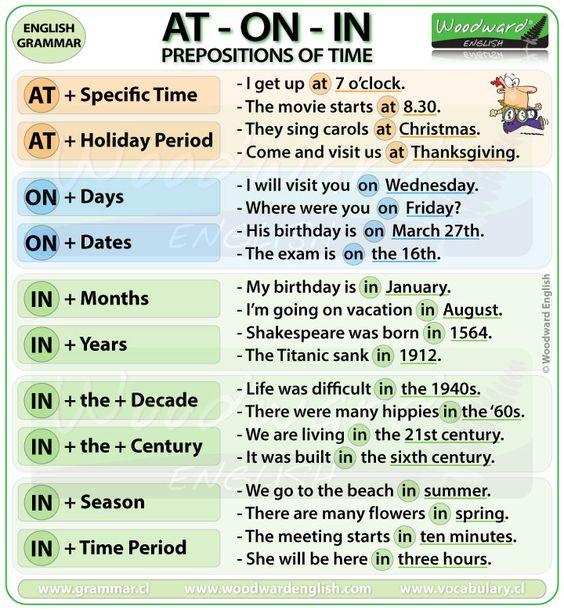The prepositions of time, "at", "on" and "in", describe when something happens, happened or will happen. What exactly is the different between these three prepositions? Let's have a look below.

When do we use "at"?
We use "at" for a specific time or hour of the day, for example:
- at 10 AM -> I get up at 10 AM on Sundays.
- at midnight -> The fireworks appear at midnight on New Year's Eve.
"At" is also used for a holiday period or a festical, such as:
- at Christmas -> We always sing carols at Christmas.
- at Thanksgiving -> My aunts come and visit us at Thanksgiving.
When do we use "on"?
We use "on" for specific days, for example:
- on Monday -> I have a doctor's appointment on Monday.
- on Wednesday -> She always goes gorcery shopping on Wednesday.
- on Christmas Eve -> We had a huge holiday family dinner on Christmas Eve.
We also use "on" when talking about dates, for instance:
- on May 20th -> My brother celebrates his birthday on May 20th.
- on December 25th -> We always visit my grandparents on December 25th.
When do we use "in"?
The preposition "in" is used with months, for example:
- in February -> My birthday is in February.
- in September -> We are moving house in September.
The preposition "in" is also used with years, for example:
- in 1789 -> The French Revolution began in 1789.
- in 1992 -> I was born in 1992.
The preposition "in" is also used with decades, such as here:
- in the 1960s -> The Beatles were the most popular band in the 1960s.
- in the 1920s -> Many Western cities experienced a time of economic prosperity in the 1920s.
The preposition "in" is also used with centuries, such as:
- in the 17th century -> Louis XIV was a French king in the 17th century.
- in the 21st century -> We are living in the 21st century.
When talking about seasons, we also use the preposition "in". For example:
- in winter -> We love to go skiing in winter.
- in spring -> I love when all the flowers bloom in spring.
When talking about a period of time, we also use the preposition "in". For example:
- in four hours -> She completed the whole marathon in four hours.
- in 10 years -> She wants to travel the world in 10 years.
For parts of the day, we also use "in", such as:
- in the morning -> I always have a cup of coffee in the morning.
- in the evening -> She wants to go out for dinner in the evening.
Note that we say "at night" and not "in night". This is a special exception to the rule.
"At the weekend" or "on the weekend"?
The word weekend has either "at" or "on" as a preposition. Typically, in British English, people say "at the weekend" and in American English you will much more often hear "on the weekend".
Are you interested in teaching English as a foreign language?
Get your TEFL certification with ITTT.
Register now & get certified to teach english abroad!


